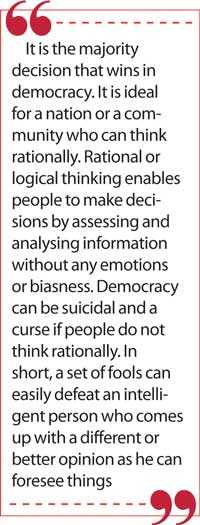Saturday Feb 14, 2026
Saturday Feb 14, 2026
Tuesday, 30 April 2019 00:00 - - {{hitsCtrl.values.hits}}

It was quite difficult at the beginning to understand how we failed as a nation to protect the precious lives of our own people and foreign tourists from brutal terrorist attacks on Easter Sunday. However, it is now becoming clear to the whole world how it happened.
In the country named as the best tourist destination 2019 on the planet, it is pathetic to see how foreign media and experts analyse what went wrong despite Sri Lanka having a time tested and competent security force. Assuming the patriotic leaders, if any and heads of key state authorities will do their best to support the brave security forces to ensure safety of all Sri Lankans as the top priority, this article attempts to highlight a few areas we all need to improve as individuals. It is a collection of relevant concepts and practices we often discuss in the business schools under individual behaviour.
This is certainly a crucial time for all Sri Lankans to act together and fight against terrorism. None of us reading this article had a choice on ethnicity at birth. Whether you are a Sinhalese, Tamil or a Muslim it was not your choice and that is how you were born. Accepting this fact we should always act consciously to respect and protect each other. Religions are there to heel the minds of followers and uplift the human spirits to bring peace and harmony, although some have gone to extremes unfortunately.
It is the majority decision that wins in democracy. It is ideal for a nation or a community who can think rationally. Rational or logical thinking enables people to make decisions by assessing and analysing information without any emotions or biasness. Democracy can be suicidal and a curse if people do not think rationally. In short, a set of fools can easily defeat an intelligent person who comes up with a different or better opinion as he can foresee things. Although we boast about the highest literacy rate that basically measures ability to read and write, our ability to understand is perhaps at a low level. This is why politicians easily deceive the majority.
As we continue with democracy, it is high time that we change the way we think as individuals. The stupid and traditional mentality of having extreme loyalty to political parties can drift the whole nation to an irreversible disaster. Similarly, not taking part in the political process as a responsible citizen, you are allowing all kinds of criminals to join the rulers officially. In this context, I believe the key messages shared in this article will be quite useful to move away from the self-destructive path we have selected due to pure ignorance and negligence.
The society comprises of individuals like you and me. Millions of us represent this nation. We have similarities as well as differences among us. This is due to various reasons such as social status, education, ethnicity and religion. Whether we work for an organisation or live in the society we must necessarily identify the values of the organisation or the society and align ourselves with those values. When our collective behaviour reflects the values of the organisation or society we call it a strong culture. If you fail to adapt to the culture, you are seen as indifferent or as an alien. This leads to mistrust.
As the culture guru Hofstede defines, culture is the glue which binds us together. Managers in organisations are expected to infuse best practices in to the culture so that they are accepted, preserved and practiced by employees with no or minimal supervision. This applies to the society as well. If these simple four factors explained below in the article make sense, the writer requests the readers to practice and share with others so that we will see gradual and sustainable progress in our society. Readers of this article are the ones who can inculcate these factors as best practices in to the culture of your organisation and the community.
Be pro-active
We should be able to foresee things and take actions in advance to avoid undesirable consequences. This is being pro-active. The need to be pro-active as a manager in business firms is a topic I often discuss in the business schools. Unfortunately and unexpectedly, the worst example to understand the consequences of not being pro-active now comes from Sri Lanka with the ruthless massacre that took place on 21 April. As you know, the opposite of being pro-active is being reactive. Here you wait and take action after the occurrence of an event. There are instances we need to operate in this mode as well.
This simple example will make it clear. We do preventive maintenance of vehicles such as changing lubricants, spark plugs and belts knowing well that failure to do so can lead to a major disaster. This is being pro-active. Similarly, fixing an electrical fault, repairing a flat tire or charging a drained battery are reactive where you take action after observing a failure.
How do we behave as a society? Our police is hiding behind bushes and lamp posts to catch speeding drivers instead of cautioning them with sign boards as it happens in developed countries. Drunken drivers are allowed to go out of city restaurants and hotels freely and once they join thousands of other vehicles on the road, police try to catch them randomly. Politicians having actively associated with political parties for decades suddenly come out with all kinds of allegations observed and tolerated from the beginning. Cricketers after losing several tournaments start making comments.
Why don’t we take actions in advance? This may be perhaps due to culture as we prefer to suffer by keeping something within us than sharing it assuming others will feel bad. Isn’t this stupidity? Let me share with you an advice by a business partner from USA who always used to say “I prefer bad news than surprises”. Now you may compare this with a typical business setting. You have agreed to ship a consignment of goods at the end of the month and a supplier has delayed a critical component you must necessarily have to complete the order. Being pro-active here is sharing a bad news to caution the importer that there is a possibility of a delay so that he also can take action in advance.
Usually, our way of handling this would be wait until the last moment to surprise. It is high time that we change our behaviour as individuals for the betterment of the nation. This applies from janitor to senator. We all are witnessing the magnitude of the possible damages of not being pro-active right now.
Be unbiased
We often fail to understand the reality due to perceptual errors. Perception describes how we give meaning to what we sense through our sensory systems. In my MBA class, I often share this interesting statement the readers may remember and recall before making important decisions. “We do not see things as they are. We see things as we are”. This simply suggests that we often look at the world through coloured lenses. Unless we realise the fact that we suffer from these perceptual errors, we can never correct ourselves. Your analysis and decisions may go wrong. You are questioned and challenged by others. The next paragraph describes some of the commonly discussed perceptual errors.
Assumed similarity suggests the danger of you unintentionally attributing the behaviour of a person who looks similar to another person known to you and almost similar in outlook. The known person can be someone very open, social and willing to assist others voluntarily. If you suffer from ‘assumed similarity’ you tend to unintentionally expect the same behaviour from a new person you are now dealing with and has the same appearance. It is unfair by the new person and your judgements and decisions can easily go wrong.
Halo effect is another perceptual error. Based on social class, profession or social status we have pre-conclusions about people. You may have a firm belief that judges are unbiased or doctors do not cheat. Is it the case always? This is not to suggest that you should suspect everyone but to emphasise the importance of not having unnecessary pre-conclusions.
Selective perception refers to people selectively interpreting what they see on the basis of their interests, background experience and attitudes. These perceptual errors make you biased and your decisions can easily go wrong.
How do we connect perceptual errors to what is going on in our society right now? We mostly look at the problem though the coloured glasses. It has gone to such heights that instead of solving the problem we unnecessarily focus on to whom we can blame. It is surprising to see matured and learned people giving various interpretations. You would observe in social media how your friends with different orientations towards certain political parties interpret the same thing differently by looking through these coloured lenses. As a nation, we all must make a conscious effort to avoid biasness. It is high time to deviate from the traditional and idiotic statements of having green, blue or any other colours of blood to boast about foolish loyalty to political parties.
Be responsible
We often do not use the available authority to take control of situations. I often say this in student presentations in the business schools I teach. Being the speaker the student should take control of the entire audience. If people are talking to each other disturbing your presentation you should have the courage to caution them or even to chase them out. Sadly, this is not happening in our organisations.
The superior or someone who is affected should remind the person to use his authority. Perhaps we prefer to make complaints and to highlight gaps in systems than attempting to use the available authority to solve problems.
Inconsistent policies and selfish political motives would have heavily discouraged state officials making decisions in the recent past. Still, we see the smart ones in both private and public sector organisations making decisions not only using the available authority but sometimes going beyond. Why I opted to discuss about authority is to highlight the flipside of it which is responsibility. How on earth can we expect someone not even using the legitimate authority to accept responsibility?
At a time when the highest authorities do not accept responsibility for not using the authority, readers may wonder as to why I suggest ordinary citizens to be responsible. The simple counter argument is that it is the irresponsible behaviour, ignorance or the ‘let go’ approach the majority of the society had in appointing the leaders which has resulted this agony. On the other hand, the audience of this article includes the leaders.
Being responsible and accountable to what is going on especially when things go wrong show the level of integrity and professional maturity. When a ferry met with a disaster killing hundreds of college students in 2014, then Prime Minister of South Korea, Chung Hon-wong resigned immediately. Years ago, the engineers of a Japanese airline opted to fly in the same aircraft after certifying its fitness for the next journey as they had a huge drop in passengers immediately after a major mishap. We see captains of sports teams in other countries resigning when they continue to lose.
A point to note is that unless you acted with responsibility you will never resign. In order to regain the lost credibility as a nation, we must start using our rights and authority and also show our accountability and responsibility. Unless we change at individual level as a nation, there is no point in keep on blaming the leaders whom we appointed for not doing the right things.
Be ethical
Ethics is about what is right and what is not right. What is right to me may not be right to you perhaps due to our religious, social and ethnic differences. Therefore, it becomes quite a complex area to study. However, practicing ethics is not that difficult. You strictly adhere to the social values and you are seen as ethical. In an organisation, it is the code of conduct you follow.
Let me explain it further for the benefit of readers who are keen in acquiring new knowledge. Ethical theories can be segregated in to consequentialist and non-consequentialist theories. Consequentialist theories explain the need of looking at the consequences of our decisions as the rational of ethics. We look at pleasure versus pain. If your decision gives pleasure for majority and pain for minority you are ethically cleared. This is how we tend to make decisions in our organisations.
How do we decide whether it is ethical to construct a new road by demolishing so many buildings? Ethical clearance is based on pleasure vs. pain. The new road will enable millions of passengers over the next 50 years which is the pleasure component. Pain will be for the dozens or hundreds of building owners who will be compensated. Based on consequentialist lens, your decision to construct the road is ethical.
However, you need to be aware that multinational companies and the western world are now adopting non-consequentialist approach in ethical decisions. Instead of looking at consequences of your decision, you are expected to pay attention to the quality of action itself. Consequences are secondary. Is this something totally new? Not at all and we are returning to our own traditions. The need for being ethical is essentially required during this time period. Irrespective of our positions and roles in the society, we must attempt to be ethical in our dealings.
Surely, politicians are the most often blamed category of people in the society. If not for the callous disregard shown by not sharing vital public safety information to avoid the world’s biggest suicide attacks, the other reason for regular blames is corruption. Is it ethical to blame only the politicians for corruption? Are they accepting bribes from other politicians? It is some of the so called corporate firms, business magnates and investors who are offering bribes. This is how some of them win over the others in fiercely competitive markets unethically. This is the same story for bribery and corruption in other levels in the society also.
Therefore, it is very clear that as individuals we need to change ourselves before demanding politicians whom we elected to be ethical. Although we tend to laugh at politicians and criticise them, we should note that they demonstrate the values, attitudes and behaviour of the society at large as our representatives.
Conclusion
Negligence and ignorance should have their limits. When those who are in power do not want to change, show unity and solidarity at a moment the future of the nation is at risk, it is up to us as individuals to start change. We are the ones who are responsible to select the leaders to run or ruin the country. We must understand at this moment of time the curse of democracy towards an ignorant society. The gradually unfolding truth will show how the western forces have planned to create instability in a country which was trying to recover from a prolonged civil war. There is no other way to resurrect than realising what went wrong and take corrective actions now itself.
Readers may easily remember the four factors discussed as PURE that suggest the importance of being Pro-active, Unbiased, Responsible and Ethical. At individual level, if we become pro-active, accept responsibility of what we do, correct perceptual errors and show ethical behaviour we can expect a better society capable of selecting the right leaders and supporting the most appropriate policies to take the country forward in the long run.
Similarly, in the short run these four factors will enable us to improve ourselves to ensure dignity, happiness and security of people of all ethnicities and religions in our country. As a nation, we are globally known for hospitality and preserving human values. Time and again, Sri Lanka has shown its resilience to disasters. Let us rise again as a strong nation by changing ourselves as individuals.
(The writer has been teaching business strategy, organisational behaviour and research methods in postgraduate programs of 18 local and international universities. The opinions/contents in this article do not represent viewpoints of any business organisation, industry association or university he works for. Email: [email protected].)